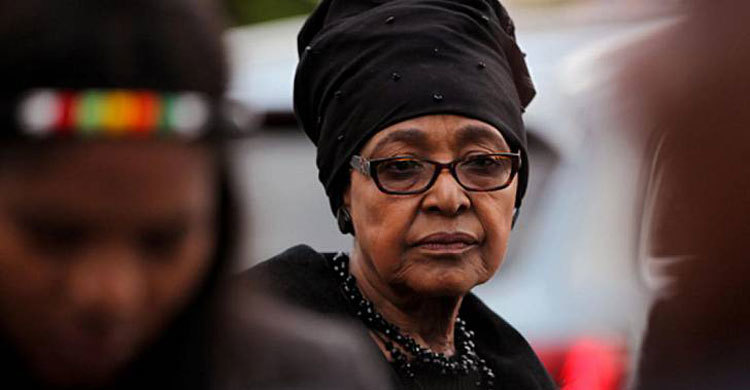Winnie Madikizela-Mandela dies aged 81

Winnie Madikizela-Mandela, the South African anti-apartheid activist and former wife of Nelson Mandela, has died peacefully following a long illness, a family spokesman said.
“She died after a long illness, for which she had been in and out of hospital since the start of the year,” Victor Dlamini said in a statement. “She succumbed peacefully in the early hours of Monday afternoon surrounded by her family and loved ones.”
Hailed as mother of the “new” South Africa, Madikizela-Mandela’s legacy as an anti-apartheid heroine was undone when she was accused of being a ruthless ideologue prepared to sacrifice laws and lives in pursuit of revolution and redress.
Her uncompromising methods and refusal to forgive contrasted sharply with the reconciliation espoused by her husband as he worked to forge a stable, pluralistic democracy from the racial division and oppression of apartheid.
The contradiction contributed to ending their marriage and destroyed the esteem in which she was held by many South Africans, although the firebrand activist retained the support of radical black nationalists to the end.
In her twilight years, Madikizela-Mandela had frequent run-ins with authority that further undermined her reputation as a fighter against the white-minority regime that ran Africa’s most advanced economy from 1948 to 1994.
During her husband’s 27-year incarceration, Madikizela-Mandela campaigned tirelessly for his release and for the rights of black South Africans.
She remained steadfast and unbowed throughout, emerging to punch the air triumphantly in the clenched-fist salute of black power as she walked hand-in-hand with Mandela out of Cape Town’s Victor Vester prison on 11 February 1990.
For husband and wife, it was a crowning moment that led four years later to the end of centuries of white domination when Mandela became South Africa’s first black president.
But for Madikizela-Mandela, the end of apartheid marked the start of a string of legal and political troubles that, accompanied by tales of her glamorous living, kept her in the spotlight for all the wrong reasons.
As evidence emerged in the dying years of apartheid of the brutality of her Soweto enforcers, the “Mandela United Football Club” (MUFC), her soubriquet switched from ”Mother of the Nation” to “Mugger”.
Blamed for the killing of the activist Stompie Seipei, who was found near her Soweto home with his throat cut, she was convicted in 1991 of kidnapping and assaulting the 14-year-old because he was suspected of being an informer. Her six-year jail term was reduced on appeal to a fine.
She and Mandela separated in 1992 and her reputation slipped further when he sacked her from his cabinet in 1995 after allegations of corruption. The couple divorced a year later, after which she adopted the surname Madikizela-Mandela.
Appearing at the Truth and Reconciliation Commission (TRC) set up to unearth atrocities committed by both sides in the anti-apartheid struggle, Madikizela-Mandela refused to show remorse for abductions and murders carried out in her name.
Only after pleading from the TRC chairman, Archbishop Desmond Tutu, did she admit grudgingly that “things went horribly wrong”.
In its final report, the TRC ruled that Madikizela-Mandela was “politically and morally accountable for the gross violations of human rights committed by the MUFC”.
Four years later, she was back in court, facing fraud and theft charges in relation to an elaborate bank loan scheme.
“Somewhere it seems that something went wrong,” magistrate Peet Johnson said as he sentenced her to five years in jail, later overturned on appeal. “You should set the example for all of us.”
Born on 26 September 1936, in Bizana, Eastern Cape province, Madikizela-Mandela became politicised at an early age in her job as a hospital social worker.
Source: Guardian



